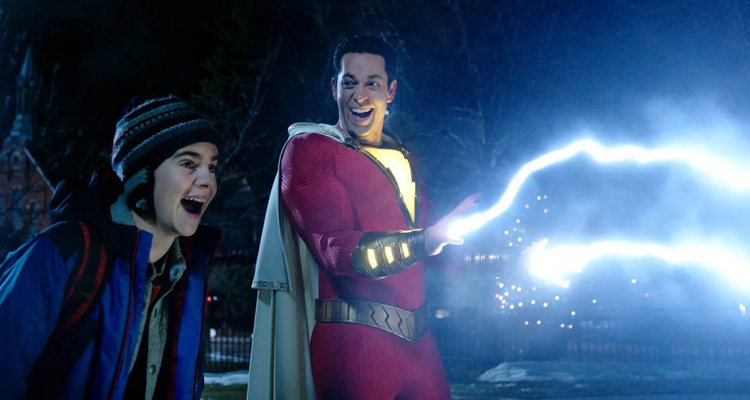We’re deep enough into the era of superhero movies that new films don’t just adapt an old character anew; they graft familiar forms and genres to comic book stories. “Shazam!” is the latest Warner Bros. film to extend the DC Universe on the big screen, but the film feels just as much like an Amblin Entertainment movie as it does a DC Comics film. It is bright and colorful, both visually and emotionally, in the way that DC movies had not been prior to “Wonder Woman” and “Aquaman.” Because the hero Shazam is a boy in a man’s body, the obvious point of reference is “Big” crossed with Superman — but in terms of how “Shazam!” actually feels, it’s surprisingly like “Gremlins” with superpowers.
“Shazam!” is carried aloft by an exuberant performance by Zachary Levi as the title character, all muscles and wide-eyed naïveté. He’s really the orphaned teen Billy Batson, played by Asher Angel, given a mystical set of mythological powers by an ancient wizard he meets in an alternate dimension during a subway ride.
Sound like insane rambling? It nearly is, which is a good reason to put praise for Levi’s work on hold in order to give credit to writer Henry Gayden and director David F. Sandberg. They manage to make the film’s ridiculous plot play with little apparent effort by orchestrating delightfully small-scale sleight of hand with scenes in which Levi explores Shazam’s powers — and falls prey to the escape they represent — while developing a pretty heavy story on the side. In the end, “Shazam!” is a darker, stranger movie than it first appears, but Gayden and Sandberg achieve enough balance to make it feel lights in the end.
The wizard, played by Djimon Hounsou, is the last of his kind. He acts as the last warden of the Seven Deadly Sins, a blobby set of living gargoyles which are eager to wreak havoc out in the real world. Knowing that he’s on his way out, the wizard spent decades searching for a pure soul to carry on his work, inadvertently creating a villain in the process. He finally picks Billy Batson, when there’s no longer time to find someone pure enough to be the custodian of the wizard’s power.
All that plot and lore — there’s even more I’ll leave for the movie — could very easily throw “Shazam!” off the rails. Gayden and Sandberg, however, keep things mostly on track by choosing a single thematic approach and sticking to it. This is a power fantasy that explores what happens when those who want power actually get it, and how power amplifies inherent character traits. We’ve seen this many times before, especially in the ‘Spider-Man‘ films. But “Shazam!” explores those ideas without straying from the core premise, and that focus makes it a more robust story.
That thematic steadfastness also allows Gayden and Sandberg to explore far and wide with respect to tone, and “Shazam!”s tonal variety is one of its greatest assets. Sandberg broke into features with horror — he expanded his own short, “Lights Out,” into a feature, then made “Annabelle: Creation” — and his genre leanings manifest in scenes of overt horror, which then veer straight into comedy before dodging into family melodrama. It’s the sort of thing Amblin and some of the other better teen movies of the ‘70s and ‘80s once did really well, and “Shazam!” occasionally gets close to the high bar set by those productions from Spielberg & Co.
(That said, the central idea of the Seven Deadly Sins wanting to escape out into the world doesn’t really work, because come on, it’s 2019, and if those sin-monsters haven’t been chewing on souls for decades, what the hell has?)
Throughout, Angel and Levi keep the two halves of the central character solid and balanced. Levi’s work, especially, is tricky, as he has to play Billy in a very different body — which leads to a notably different temperament for the character as Shazam’s power frees Billy from some of his family woes. Both actors often play against Jack Dylan Grazer, as Freddy Freeman, Billy’s new foster brother, who suffers from a physical disability and no small obsession with superheroes like Superman and Batman. Many of the film’s best scenes feature Grazer and Levi exploring Shazam’s powers, and living out the life they imagine they’d want to have. A few bum notes aside, such as two lame strip club gags, it’s a nimble, effervescent take on the superhero origin story.
Levi’s character is balanced by Mark Strong as Thaddeus Sivana, who as a boy was nearly given the powers of Shazam, and has spent his life trying to get back to that defining moment. It’s a scene-chewing role and Strong doesn’t hold anything back. He and Levi are well-matched in that respect.
A sizable supporting cast — Grace Fulton, Ian Chen, Jovan Armand, and particularly Faithe Herman as Billy’s other foster siblings, and Cooper Andrews and Marta Milans as his foster parents — nearly turns the film into an ensemble, and all deliver good performances. Levi outshines everyone, however. He gets the best material, but plays it so well that I always wanted to see more of him. “Shazam!” felt a little empty when he wasn’t on screen, but the climactic battle compensates for that (overcompensates, really) with a callback to classic Shazam comics that leaves the end ringing with good feelings. [B+]

